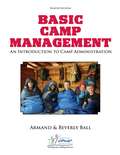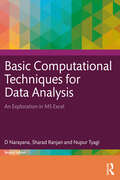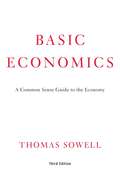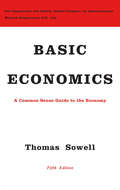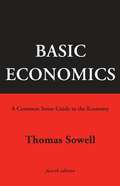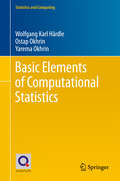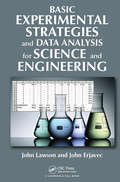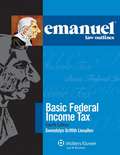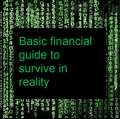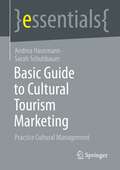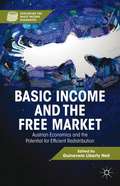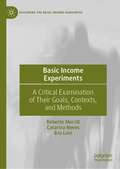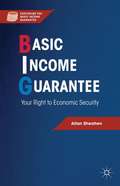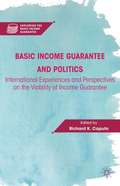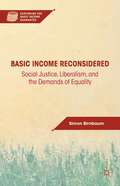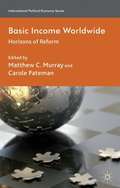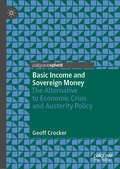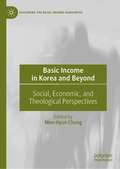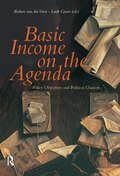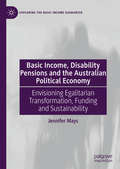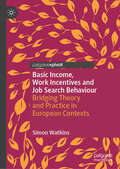- Table View
- List View
Basic Camp Management: An Introduction to Camp Administration
by Armand Ball Beverly BallManage your camp more effectively with the leading textbook for camp administration courses everywhere. The newly revised 8th edition of Basic Camp Management: An Introduction to Camp Administration provides overviews of 19 key areas that define successful camp operations, including the latest in outcomes and programming research, staff hiring and training, and business and technology, all of which are supported by nationally recognized standards from the American Camp Association.
Basic Capital Investment Analysis
by William J. Bruns Jr.Discusses the net present value and internal rate of return methods for analyzing capital investments. Assumes prior knowledge of compound interest and present value methods.
Basic Computational Techniques for Data Analysis: An Exploration in MS Excel
by Sharad Ranjan D Narayana Nupur TyagiThis book is designed to equip students to navigate through MS Excel and basic data computation methods, which are essential tools in research or professional settings and in classrooms. It illustrates the concepts used in research and data analysis and economic and financial decision-making in business and in daily life. The book will help students acquire knowledge and develop skills in statistical techniques and financial analysis using MS Excel. With illustrations and examples, it will help the readers to: • Visualize, present, and analyze data through MS Excel spreadsheets and tables and create personal or business spreadsheets • Learn how to work with spreadsheets, use formulae, and perform calculations and analysis • Create tables including Pivot Tables • Become familiar with basic statistical and financial measures • Design creative spread sheets and communicate effectively in business using spreadsheets and data analysis This revised and updated second edition will be an essential resource for students of economics, commerce, management, and other social science subjects, and will be useful to those studying econometrics, financial technology, basic computational techniques, data analysis, and applied economics. Content The book is developed through three phases, with each phase standing on its own as well as providing a foundation for the next. In the first phase, Excel is introduced for the students to learn entry of data, manipulation of data, carrying out operations and develop presentations. The second phase introduces basic statistical measures of data summarisation and analysis, following which these are illustrated in Excel spreadsheets with the techniques introduced in the first phase. In addition, a few advanced tools of statistical analysis are introduced and illustrated in Excel. The third phase introduces financial measures of common use, their general computation and working them out in Excel. The book intends to illustrate the concepts used in economic and financial decision-making in business and in daily life; it helps demonstrate a deeper understanding from both theoretical and practical perspectives. An effort has been made to make the book student-friendly by using simple language and giving a number of illustrations in each chapter, solved in such a simple manner that they can be easily understood by the students. Practical questions have been included at the end of each chapter so that the students can independently solve them and test their understanding of the concepts and computations introduced in the chapter. Outcome At the end, students will be able to describe what a spreadsheet is and what Excel’s capabilities are and can work with elements that make up the structure of a worksheet. They will be able to work with spreadsheets and enter data in Excel, use formulae and calculations, and create tables, charts and pivot tables. They will be familiar with basic statistical and financial measures of general use. They will be able to do basic computations in statistics and finance in Excel. Students will acquire the capacity to create personal and/or business spreadsheets following current professional and/or industry standards. Their potential for critical thinking to design and create spreadsheets and communicate in a business setting using spreadsheet vocabulary will be enhanced. In the digital age, students necessarily need to know data, data sources and how to ‘dirty’ their hands with data. There can be no substitute to ‘talking through numbers’. The book introduces students to a variety of Indian and International data sources and teaches them how to import data-be it social, economic, financial and so on-to the Excel sheet. Once they master it, the data world is there for them to conquer! The educational background required for the student to understand the text is some basic English and Mathematics of school-leaving level. Some fl air for numbers will be an asse
Basic Economics
by Thomas SowellIn this third edition of Basic Economics, Thomas Sowell revises and updates his popular book on common sense economics, bringing the world into clearer focus through a basic understanding of the fundamental economic principles and how they explain our lives. Drawing on lively examples from around the world and from centuries of history, Sowell explains basic economic principles for the general public in plain English. Basic Economics, which has now been translated into six languages and has additional material online, remains true to its core principle: that the fundamental facts and principles of economics do not require jargon, graphs, or equations, and can be learned in a relaxed and even enjoyable way.
Basic Economics
by Thomas SowellIn this fifth edition of Basic Economics, Thomas Sowell revises and updates his popular book on common sense economics, bringing the world into clearer focus through a basic understanding of the fundamental economic principles and how they explain our lives. Drawing on lively examples from around the world and from centuries of history, Sowell explains basic economic principles for the general public in plain English. Basic Economics, which has now been translated into six languages and has additional material online, remains true to its core principle: that the fundamental facts and principles of economics do not require jargon, graphs, or equations, and can be learned in a relaxed and even enjoyable way.
Basic Economics 4th Ed
by Thomas SowellWhy are homeless people sleeping on the sidewalks of New York in the winter, when the abandoned apartment buildings in the city have four times as many dwelling units as there are homeless people in the city? Why did Russians have to import food to feed people in Moscow, when Russia itself had vast amounts of some of the richest farmland in Europe within easy driving distance? Why did unemployment reach 25 percent and American corporations as a whole operate in the red for two years in a row during the Great Depression of the 1930s? All these very different, but equally puzzling and needless, tragedies grew out of a failure to understand and apply basic economics principles. Explaining these principles for the general public in plain English, with neither graphs nor equations nor jargon, is the goal and achievement of Basic Economics by Thomas Sowell. His lively examples are drawn from around the world and from centuries of history because the basic principles of economics are not limited to modern capitalist societies and apply even to situations where no money changes hands, such as caring for wounded soldiers on a battlefield. The focus of Basic Economics is not on how individuals make money but on how societies create prosperity or poverty for their peoples by the way they organize their economies. Prosperous countries with few natural resources, such as Japan and Switzerland, are as common as poor countries with rich resources, such as Russia and Mexico. The fourth edition of Basic Economics is both expanded and updated. A new chapter on the history of economics itself has been added, and the implications of that history examined. A new section on the special role of corporations in the economy has been added to the chapter on government and big business, among other additions throughout the book. Basic Economics, which has now been translated into six languages, has grown so much that a large of amount of material in the back of the book in previous editions has now been put online instead. The central idea of Basic Economics, however, remains the same: that the fundamental facts and principles of economics do not require jargon, graphs, or equations, and can be learned in a relaxed and even enjoyable way.
Basic Economics 4th Ed
by Thomas SowellA revised edition of the classic introduction to economics, updated with new material on the economic crisis of 2008 and the first years of the Obama administrationOCOs policies. "
Basic Economics 4th Ed
by Thomas SowellWhy are homeless people sleeping on the sidewalks of New York in the winter, when the abandoned apartment buildings in the city have four times as many dwelling units as there are homeless people in the city? Why did Russians have to import food to feed people in Moscow, when Russia itself had vast amounts of some of the richest farmland in Europe within easy driving distance? Why did unemployment reach 25 percent and American corporations as a whole operate in the red for two years in a row during the Great Depression of the 1930s? All these very different, but equally puzzling and needless, tragedies grew out of a failure to understand and apply basic economics principles. Explaining these principles for the general public in plain English, with neither graphs nor equations nor jargon, is the goal and achievement ofBasic Economicsby Thomas Sowell. His lively examples are drawn from around the world and from centuries of history because the basic principles of economics are not limited to modern capitalist societies and apply even to situations where no money changes hands, such as caring for wounded soldiers on a battlefield. The focus ofBasic Economicsis not on how individuals make money but on how societies create prosperity or poverty for their peoples by the way they organize their economies. Prosperous countries with few natural resources, such as Japan and Switzerland, are as common as poor countries with rich resources, such as Russia and Mexico. The fourth edition ofBasic Economicsis both expanded and updated. A new chapter on the history of economics itself has been added, and the implications of that history examined. A new section on the special role of corporations in the economy has been added to the chapter on government and big business, among other additions throughout the book. Basic Economics, which has now been translated into six languages, has grown so much that a large of amount of material in the back of the book in previous editions has now been put online instead. The central idea ofBasic Economics, however, remains the same: that the fundamental facts and principles of economics do not require jargon, graphs, or equations, and can be learned in a relaxed and even enjoyable way.
Basic Elements of Computational Statistics (Statistics and Computing)
by Wolfgang Karl Härdle Ostap Okhrin Yarema OkhrinThis textbook on computational statistics presents tools and concepts of univariate and multivariate statistical data analysis with a strong focus on applications and implementations in the statistical software R. It covers mathematical, statistical as well as programming problems in computational statistics and contains a wide variety of practical examples. In addition to the numerous R sniplets presented in the text, all computer programs (quantlets) and data sets to the book are available on GitHub and referred to in the book. This enables the reader to fully reproduce as well as modify and adjust all examples to their needs. The book is intended for advanced undergraduate and first-year graduate students as well as for data analysts new to the job who would like a tour of the various statistical tools in a data analysis workshop. The experienced reader with a good knowledge of statistics and programming might skip some sections on univariate models and enjoy the various ma thematical roots of multivariate techniques. The Quantlet platform quantlet. de, quantlet. com, quantlet. org is an integrated QuantNet environment consisting of different types of statistics-related documents and program codes. Its goal is to promote reproducibility and offer a platform for sharing validated knowledge native to the social web. QuantNet and the corresponding Data-Driven Documents-based visualization allows readers to reproduce the tables, pictures and calculations inside this Springer book.
Basic Experimental Strategies and Data Analysis for Science and Engineering
by John Lawson John ErjavecEvery technical investigation involving trial-and-error experimentation embodies a strategy for deciding what experiments to perform, when to quit, and how to interpret the data. This handbook presents several statistically derived strategies which are more efficient than any intuitive approach and will get the investigator to their goal with the fewest experiments, give the greatest degree of reliability to their conclusions, and keep the risk of overlooking something of practical importance to a minimum. Features: Provides a comprehensive desk reference on experimental design that will be useful to practitioners without extensive statistical knowledge Features a review of the necessary statistical prerequisites Presents a set of tables that allow readers to quickly access various experimental designs Includes a roadmap for where and when to use various experimental design strategies Shows compelling examples of each method discussed Illustrates how to reproduce results using several popular software packages on a companion web site Following the outlines and examples in this book should quickly allow a working professional or student to select the appropriate experimental design for a research problem at hand, follow the design to conduct the experiments, and analyze and interpret the resulting data. John Lawson and John Erjavec have a combined 25 years of industrial experience and over 40 years of academic experience. They have taught this material to numerous practicing engineers and scientists as well as undergraduate and graduate students.
Basic Federal Income Tax (Fourth Edition)
by Gwendolyn Griffith LieuallenThe most trusted name in law school outlines, Emanuel Law Outlines support your class preparation, provide reference for your outline creation, and supply a comprehensive breakdown of topic matter for your entire study process. Created by Steven Emanuel, these course outlines have been relied on by generations of law students. Each title includes both capsule and detailed versions of the critical issues and key topics you must know to master the course. Also included are exam questions with model answers, an alpha-list of cases, and a cross reference table of cases for all of the leading casebooks.
Basic Financial Guide
by Celia RodriguezWarning: this is the book that financiers DO NOT want you to read. All you earn is used to pay? Your salary is not enough? As much as you work, you never live as you want? This is all because you are making basic mistakes which you are unaware of. Here I will explain why this is happening to you. You do not need to know economics, finance, or be an expert in the Stock Market to understand it. This book is written in the simplest and most realistic language possible, adapted for all audiences.
Basic Guide to Cultural Tourism Marketing: Practice Cultural Management (essentials)
by Andrea Hausmann Sarah SchuhbauerThis essential knowledgeably explains the key decisions to be made in the practice of cultural tourism marketing. After an introduction to the term and the central characteristics, the main activities in the planning process of cultural tourism marketing are presented. Building on this, Andrea Hausmann describes marketing strategies that are particularly relevant in practice, dealing with the different types of cultural tourism demand (segmentation), brand management (branding), the realization of innovations (digitalization) and entering into cooperations or forming networks. Finally, typical focal points in the marketing mix of cultural tourism service providers are highlighted and the importance of personnel for the quality experience of demand is elaborated.The author:Prof. Dr. Andrea Hausmann is a professor at the Institute for Cultural Management at the Ludwigsburg University of Education. She advises cultural enterprises and tourism organisations on the topics of cultural tourism, marketing and personnel.
Basic Income And The Free Market
by Guinevere Liberty NellDiscusses whether the Basic Income Guarantee could offer an alternative to both laissez-faire and existing welfare systems in developed countries - often criticized by both advocates and critics of laissez-faire - thus opening a constructive dialog in policy discussion.
Basic Income Experiments: A Critical Examination of Their Goals, Contexts, and Methods (Exploring the Basic Income Guarantee)
by Roberto Merrill Catarina Neves Bru LaínThis book brings together insights and reflections following a set of interviews conducted with the main stakeholders involved in past, current, and future basic income experiments. It provides an analysis of some of the major elements and factors influencing experiments, as well of some of their most important outputs understood as results of their own experimental design, their sociological and political basis, and the epistemological status of their results.By pursuing a bottom-up strategy, where the interviews conducted take a pivotal role in the collection and analysis phase of the book, this book gathers key questions relating to policy experiments. Some questions reflected upon include the general idea of why one should engage and implement a basic income experiment, and the paradox consisting in the fact that most basic income experiments fall short of being closely considered “pure” basic income schemes. In facing the question and the paradox head-on, the book assesses questions of experimental design, the political and social context surrounding the policy, and the main results and what can they tell us about basic income.
Basic Income Guarantee
by Allan SheahenThis book, an updated version of Sheahen's original 1983 work, is a comprehensive look at a Basic Income Guarantee (BIG) and what it would mean for the United States today.
Basic Income Guarantee and Politics: International Experiences And Perspectives On The Viability Of Income Guarantee (Exploring The Basic Income Guarantee Ser.)
by Richard K. CaputoThis exciting and timely collection brings together international and national scholars and advocates to provide historical overviews of efforts to pass basic income guarantee legislation in their respective countries and/or across regions of the globe.
Basic Income Reconsidered
by Simon BirnbaumBasic income is one the most innovative, powerful and controversial proposals for addressing poverty and growing inequalities. This book examines the arguments for and against basic income from the point of view of economic and social justice.
Basic Income Worldwide
by Carole Pateman Matthew C. MurrayIn the midst of growing criticism of current economic orthodoxies and welfare systems, basic income is growing in popularity. This is the first book to discuss existing at examples of basic income, in both rich and poor countries, and to consider its prospects in other places around the world.
Basic Income and Sovereign Money: The Alternative to Economic Crisis and Austerity Policy
by Geoff Crocker“This is a radical, thought-provoking book, which brings together debates that are often kept separate about basic income and 'sovereign money'. You might not agree with all of it, but it makes big arguments and does so with constructive intent: that of proposing alternative ways of organising our economy and welfare states.”Nick Pearce, Director of The Institute for Policy Research, University of Bath, UK“Though I have criticized modern money theory (MMT) for being too facile regarding the consequences of money financed deficits, I welcome this book’s advocacy of a universal basic income. MMT proponents have focused on the problem of employment. Geoff Crocker wants to shift the focus to basic income, and I believe he is right. We are in an era of transition. Employment was the fundamental problem of the 20th century. Income distribution will be the fundamental problem of the 21st century. We must begin transitioning the policy discourse now. In coming decades we will need both employment and basic income policy. It is good to have MMT advocates on board.”Thomas Palley, independent economist, Washington, DC, USA"Geoff Crocker's book is a very stimulating and provoking contribution to the discussion of how to define, identify, and finance basic income. It addresses very clearly the societal issue of a monetary basic income funding which will excite the discussion beside well --known tax proposals, and establishes the discussion on integrating basic income directly into crisis prevention and crisis solution."Bernhard Neumärker, Götz Werner Professor of Economic Policy & Constitutional Economic Theory and Head of Freiburg Institute for Basic Income Studies (FRIBIS) at the University of FreiburgThe current economic system is dysfunctional, characterised by crises, austerity, excessive household and government debt, low pay, poverty, inequality, and ecological damage. This needs a radical re-think and re-engineering of the economic system. The standard explanation of the 2007 economic crisis is that banks behaved badly and governments failed to regulate. But policies of tighter bank regulation, quantitative easing, and austerity failed, and proved counter-productive. This book challenges this orthodox view. From a careful analysis of long-term economic data, it shows that earned income has inexorably fallen behind economic output, leading to huge increases in consumer debt, causing the crisis. Governments have sought to curtail deficit spending by socially harmful austerity policy. The answer is a universal basic income, funded by debt-free sovereign money, which also funds government social expenditure, always limited by economic output to avoid inflation. This book will appeal to policy makers, academic economists, think tank networks, and everyone who is concerned with the ongoing dysfunctionality of the current economic system.
Basic Income in Japan
by Yannick Vanderborght Toru YamamoriBasic Income in Japan discusses the potential of an unconditional basic income (UBI) in the context of a transforming Japanese welfare state.
Basic Income in Korea and Beyond: Social, Economic, and Theological Perspectives (Exploring the Basic Income Guarantee)
by Mee-Hyun ChungThis book shows that basic income is a powerful tool for realizing economic justice in our modern society. Through an interdisciplinary investigation of basic income in Korea, involving theological and social scientific perspectives, the book covers the topic of basic income on an academic basis, an economic basis, and in terms of its institutionalization potential.Although modern society is a global one, centered on the economic ideology of neo-liberalism, the negative effects of social polarization caused by this are quite severe. It is also urgent to come up with alternative solutions to the problems of labor reduction and wage labor. Moreover, the expansion of productivity through collaboration between humans and artificial intelligence also presents a challenge. An interdisciplinary study on the meaning and restructuring of labor is therefore needed. This book traces themes supporting the concept of basic income appearing in the Old and New Testaments, as well as precedents relating to basic income in the context of capitalism in the thought of the Reformers. Within the framework of Christian ethics, the book looks at the ideological basis for basic income and its applicability to the current situation in order to pursue economic justice. Additionally, the book examines the practical feasibility and rationale for basic income by discussing the economics of basic income financing and the political economy implications for how it can be applied to real politics.
Basic Income on the Agenda: Policy Objectives and Political Chances
by Loek Groot Robert-Jan VeenPersisting unemployment, poverty and social exclusion, labour market flexibility, job insecurity and higher wage inequality, changing patterns of work and family life are among the factors that exert pressure on welfare states in Europe. This book explores the potential of an unconditional basic income, without means test or work requirement, to meet the challenges posed by the new social question, compared to policies of subsidized insertion in work. It also assesses the political chances of basic income in various European countries. These themes are highly relevant to policy-makers in the field of labour markets and social security, economists, political philosophers, and a social science audience in general.
Basic Income, Disability Pensions and the Australian Political Economy: Envisioning Egalitarian Transformation, Funding and Sustainability (Exploring the Basic Income Guarantee)
by Jennifer MaysGlobal developments in basic income have reinvigorated political debates on the necessity of progressing to universal basic income implementation. Basic income is a powerful strategy for addressing poverty gaps and growing inequality. This book provides new insights and strategies from an Australian political economy perspective to respond to implementation challenges and distributive justice. The book positions the disability dimension and disability pensions in relation to basic income to explore strategies for strengthening universal provisions. It illustrates the need for socially just conditions and adequate financing to underpin redistribution as a way of safeguarding the sustainability of basic income.
Basic Income, Work Incentives and Job Search Behaviour: Bridging Theory and Practice in European Contexts (Exploring the Basic Income Guarantee)
by Simon WatkinsThis book analyzes existing welfare regimes across Europe, offering an exploration into how basic income principles might influence job search behaviour. Drawing on time-use data and fuzzy-set qualitative comparative analysis, it challenges assumptions about work incentives and demonstrates that institutional contexts significantly mediate welfare effects. The analysis develops an innovative &“ideal type&” framework that measures how existing systems approximate basic income principles, unconditionality, universalism, and non-withdrawal of benefits. Chapters explore the complex relationships between welfare design and job search intensity, with a special focus on providing evidence as to whether conditionality increases job search or if certain configurations of accessibility and high participation tax rates decrease it. Comparing ten European countries and counterfactual examination of Finland and the UK, the book provides empirical grounding for debates often based on theoretical assumptions. The resulting text provides insights for designing context-appropriate strategies for basic income implementation that enhance income security while preserving individual autonomy.
